
The calls and texts came seemingly at random, on landlines and mobile phones across southern Lebanon and parts of Beirut. They left their recipients, ground down by almost a year of conflict, with little doubt about what to expect.
“Hizbollah is forcing the Israeli army to act against its terrorist infrastructure in your villages,” a voice in slightly accented Arabic said to the thousands of people contacted on Monday. “Residents of this area must leave your homes now . . . because we do not wish to harm you.”
The warnings from Israel had echoes of those it gave to Palestinians in Gaza ahead of new offensives, and within hours Lebanon too felt the brunt of Israel’s heaviest bombardment of the country in decades.
Israel’s military struck hundreds of targets stretching across southern and eastern Lebanon, killing 356 people and injuring more than 1,200, according to the Lebanese health ministry.
No day had been as bloody in Lebanon since Israeli tanks rolled over its border in 2006, triggering a 34-day war with Hizbollah.
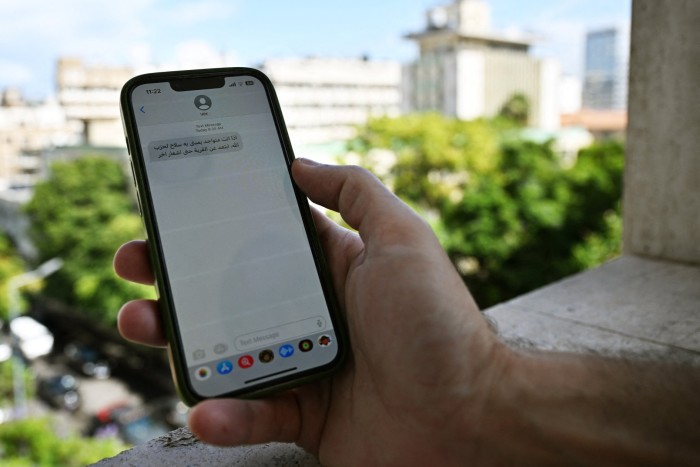
As the air strikes rolled through Monday, panic spread through swaths of Lebanon.
The country had been gripped by angst since Iran-backed Hizbollah launched rockets at Israel the day after Hamas’s deadly assault on southern Israel last October. For many, a land war felt all but inevitable.
“It’s massacre upon massacre upon massacre,” said Abboudi, an emergency responder in Nabatiyeh, southern Lebanon, who spent the day dodging air strikes and transporting victims to nearby hospitals.
Monday’s violence hit a country still haunted by its civil war, which saw various sectarian militias brutalise one another and their respective communities from 1975 to 1990.
When it ended, Beirut was in ruins, as was its social fabric, the ravages of war visible in every neighbourhood.
The country has been shaken by bouts of violence and instability since, not least the devastating 2006 war with Israel, and the 2020 Beirut port blast, which killed more than 200 people, injured thousands more and levelled parts of the city.
Praised for their resilience, Lebanese citizens often wonder how much more they and their small country can take.
Lebanon’s health ministry on Monday said women, children and medics were among the dead. Footage on social media showed them bloodied and broken, being pulled from rubble.
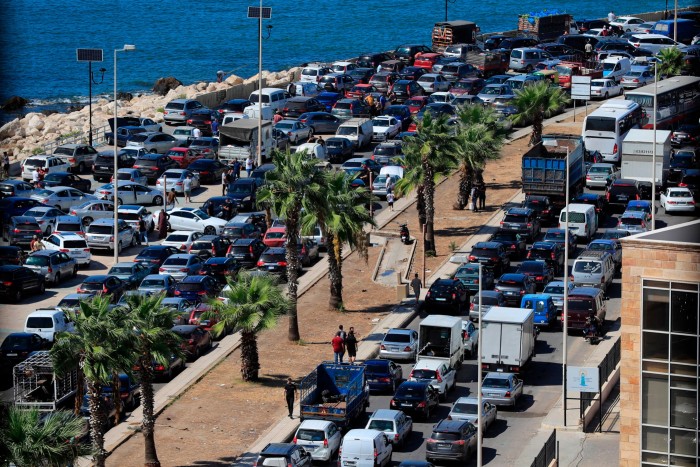
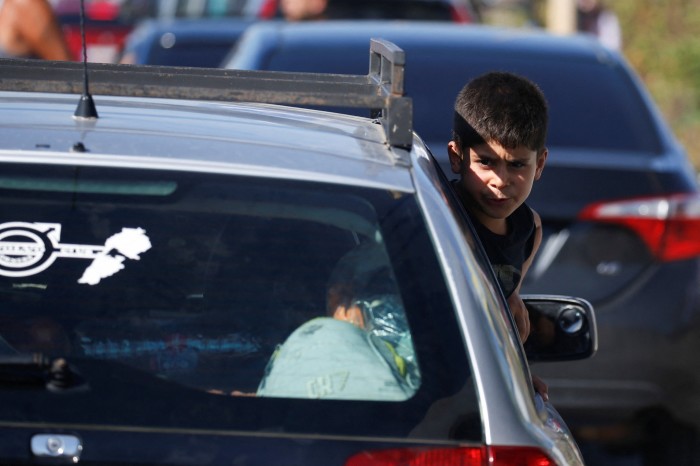
Tens of thousands of people fled north in a chaotic exodus, packed tightly into cars that jammed the main highway all the way to Beirut, as plumes of smoke rose behind them.
WhatsApp groups sprang up with offers of housing for the displaced, while schools were converted into emergency shelters.
“We have no idea where to go and my children are hungry,” Abu Ali Ahmad desperately asked a police man in Beirut, after arriving in a pick-up truck with his wife and four children.
Others were frantically heading to supermarkets to stock up on canned goods and fuel, running errands they thought they wouldn’t be able to once the war “really” began.
University student Abir Hammoud said she had been “paralysed with fear” waiting for her mother to pick her up after classes were cancelled.
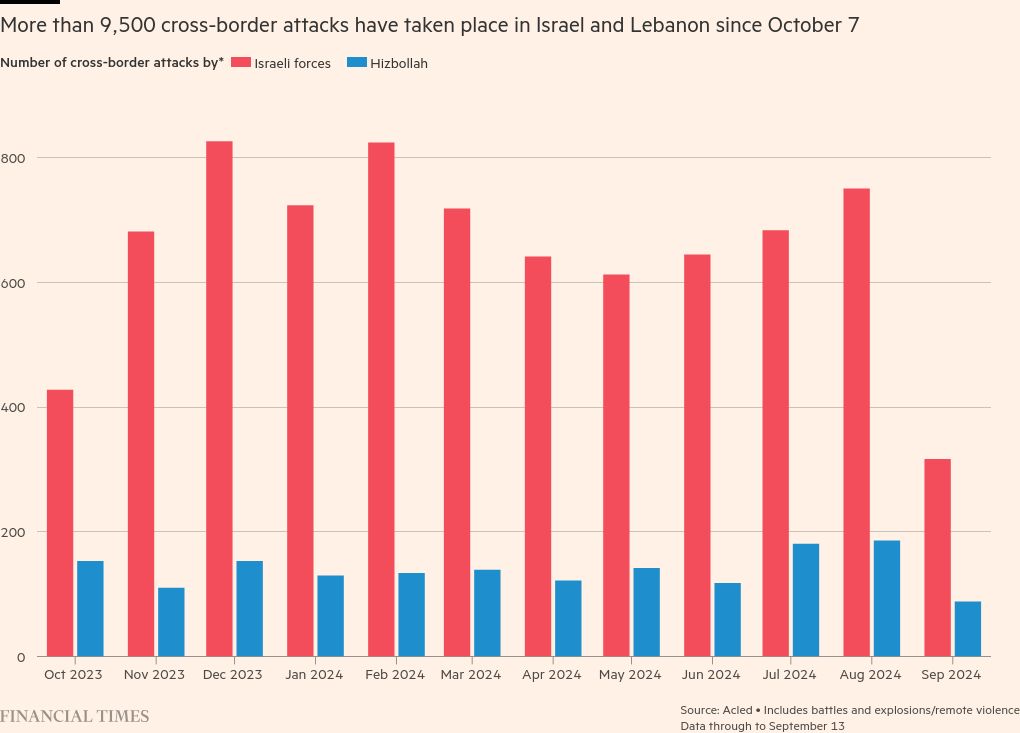
With traffic across the city at a standstill, she found comfort by donating blood. “I don’t know what else to do,” Hammoud said.
Monday was the culmination of a devastating week for both Lebanon and Hizbollah, its most powerful political and military force.
Mass detonations ripped through the militant group’s communications devices, killing 37 people, followed by an air strike that wiped out two senior commanders, more than a dozen elite officers and scores more civilians on Friday.
It was a stinging blow to Hizbollah that undermined its credibility in the eyes of its members and support base. Some in Beirut speculated that Monday’s warnings to residents were designed to further weaken their spirits.
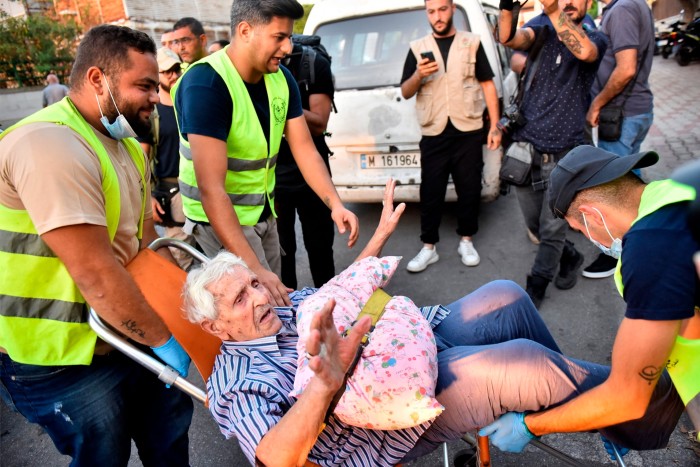
With around 110,000 people already displaced along Lebanon’s southern border, it was not clear how many people would be affected by Israel’s warnings. But there were still several thousand people living within 5km of the border, according to government data.
Israel has accused Hizbollah of transforming entire communities in the south into military zones, hiding rocket launchers and other infrastructure in residential communities from which it draws support.
The Israeli warnings left open the possibility that some residents could be living in or near targeted structures, without knowing that they are at risk.
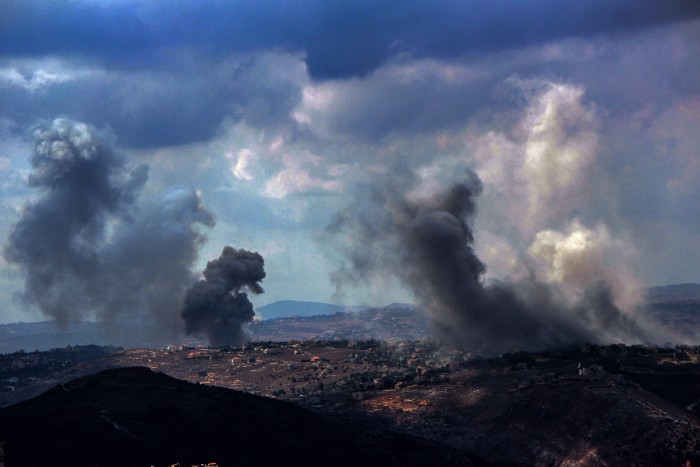
That uncertainty was the final straw for many fleeing north on Monday.
“I stayed as long as I could, I really did,” said Nelly Abboud, who packed her car with her three kids and left Nabatiyeh to stay with relatives in Beirut. “But I couldn’t take it any more — I don’t want to die, I don’t want my kids to die.”
As she drove north, Israeli Prime Minister Benjamin Netanyahu urged the Lebanese people to “get out of harm’s way now”. “Once our operation is finished, you can come back safely to your homes,” he said.
“How can we believe anything they say?” asked Abboud. “My parents stayed behind . . . because they know Israel wants to make them leave and seize their land. We know this has been the Israeli strategy since day one.”
Data visualisation by Steven Bernard